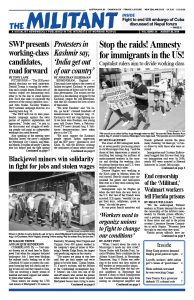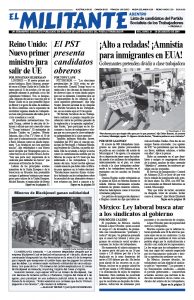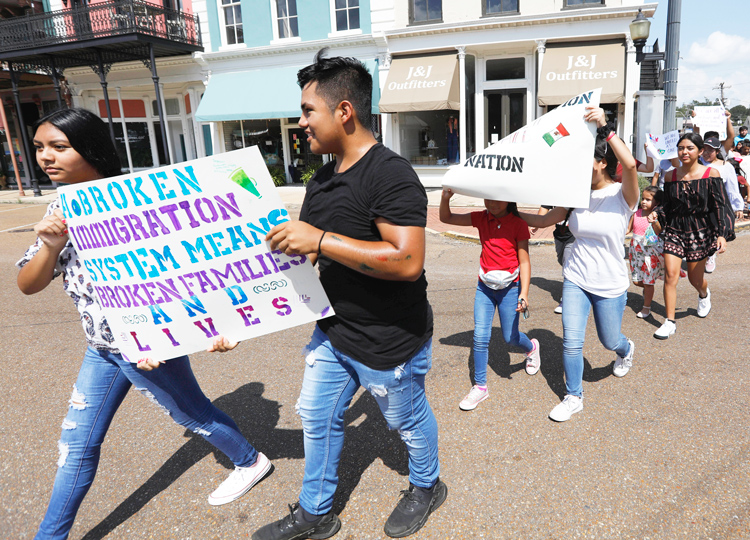The arrest of 680 immigrant workers at seven poultry processing plants in six Mississippi cities Aug. 7 and the threat of their deportation is aimed at instilling fear among the millions of undocumented workers in the country and dividing the working class by pitting foreign-born and U.S.-born workers against each other.
Desiree Hughes was working at the Koch plant in Morton when the raid started. Heavily armed cops surrounded the plants and helicopters flew over as if they were seeking dangerous criminals.
Immigration cops let Hughes go when she told them she was born in the U.S. But two of her friends were arrested. ICE agents “wouldn’t let me get their keys, cellphones, speak to them,” she told the press.
At one point family members and friends gathered outside the plant, many chanting “let them go,” as buses drove by with those who were arrested.
Immigration and Customs Enforcement bragged that this was their largest immigration raid ever. In 2008, nearly 600 were arrested at Howard Industries in Laurel, Mississippi.
“You have to try to fight, try to find a lawyer, try to get them out, try to fight the system,” Maria Elizabeth Tello, another U.S. citizen who works at Koch, told the media. “These people haven’t done anything. They’re just here to work.”
While many U.S.-born workers, like Hughes, oppose the raids and deportations, some workers in the plant have been taken in by the virulent anti-immigrant rhetoric of sections of the U.S. ruling class. They yelled, “Take them away” during the raid, Tello reported.
The next day supporters of immigrants rights held a press conference and protest meeting at the NAACP offices in Jackson.
Jason Coker, field coordinator of the Jackson-based Cooperative Baptist Church, took part in the meeting. He told the Militant in an Aug. 12 interview that he went to Canton after the raid there at Peco Foods.
“These people have been here 14, 15, 16 years and all their children were born and raised in Canton,” he said. Coker called the raid and possible deportations “diabolical.”
Wayne Daniels, president of the Jackson chapter of the NAACP, told the meeting it will do whatever it can to support the families of those detained.
The day after the raid, more than 300 of those held had been released, according to ICE, but had to wear GPS ankle bracelets.
Federal prosecutor Mike Hurst told a press conference that the raids are equally aimed at undocumented workers and those that employ them “who use illegal aliens for competitive advantage.” But the raids, in fact, aid the bosses in their efforts to drive down wages by increasing the fear of undocumented workers that they might be seized by ICE.
Two of the factories raided, a Koch Foods plant in Morton and the Peco Foods plant in Canton, are organized by the United Food and Commercial Workers. Union officials, however, did not issue a call for preventing the deportation of the workers but for their “right to due process.”
President Donald Trump defended the raids Aug. 9, saying, “I want people to know that if they come into the United States illegally, they’re getting out.”
His policy stands on the shoulders of previous administrations. Until 2008 factory raids were routine. But in the wake of massive protests by immigrant workers in 2006 — including a May 1 strike of more than a million protesting proposed anti-immigrant legislation — almost every raid was met by protests that included significant numbers of U.S.-born workers.
After 2008, the U.S. government shifted to so-called silent raids, firing thousands of workers at plants after ICE conducts immigration “audits.”
The Trump administration has brought back factory raids. Nonetheless, the rate of deportations under his administration is still less than under Bill Clinton or Barack Obama.
The U.S. rulers for now have no intention of carrying out mass deportations. They depend on immigrant labor to compete against their rivals around the world.
In fact, in the face of what many bosses see as a labor shortage, Washington has been expanding its “guest worker” program by more than tripling the number of visas since 2017 to more than 250,000 this year.
Under the program, workers get temporary visas that allow them to work “legally” in the U.S. But if they quit or are fired, they are subject to deportation.
“Working people need to overcome the competition and divisions among us fostered by the bosses and their political system,” said Candace Wagner, Socialist Workers Party candidate for New Jersey General Assembly. “We need to demand amnesty for workers without papers and an immediate end to the raids and deportations.”


